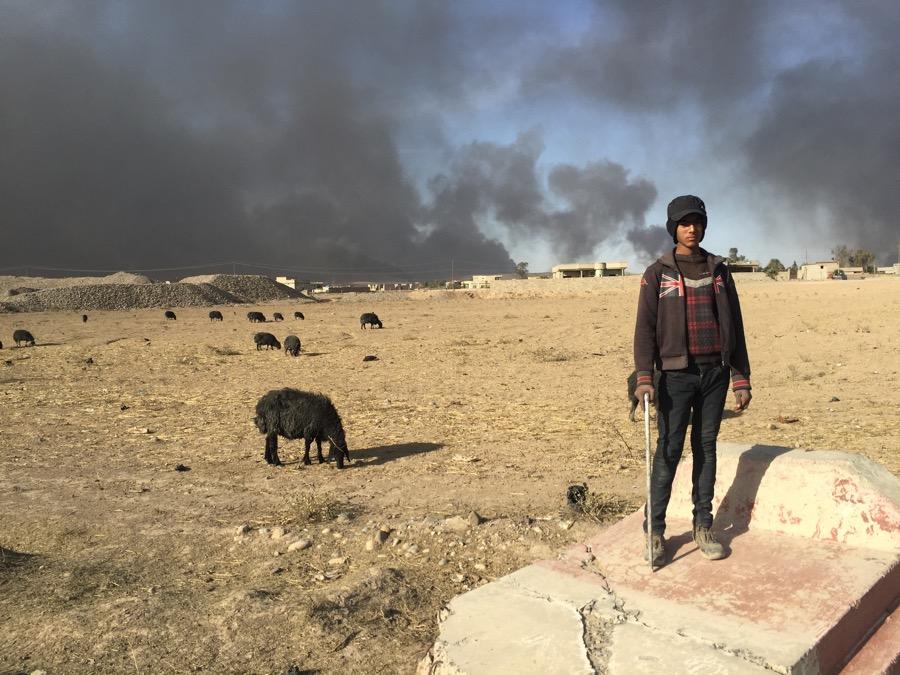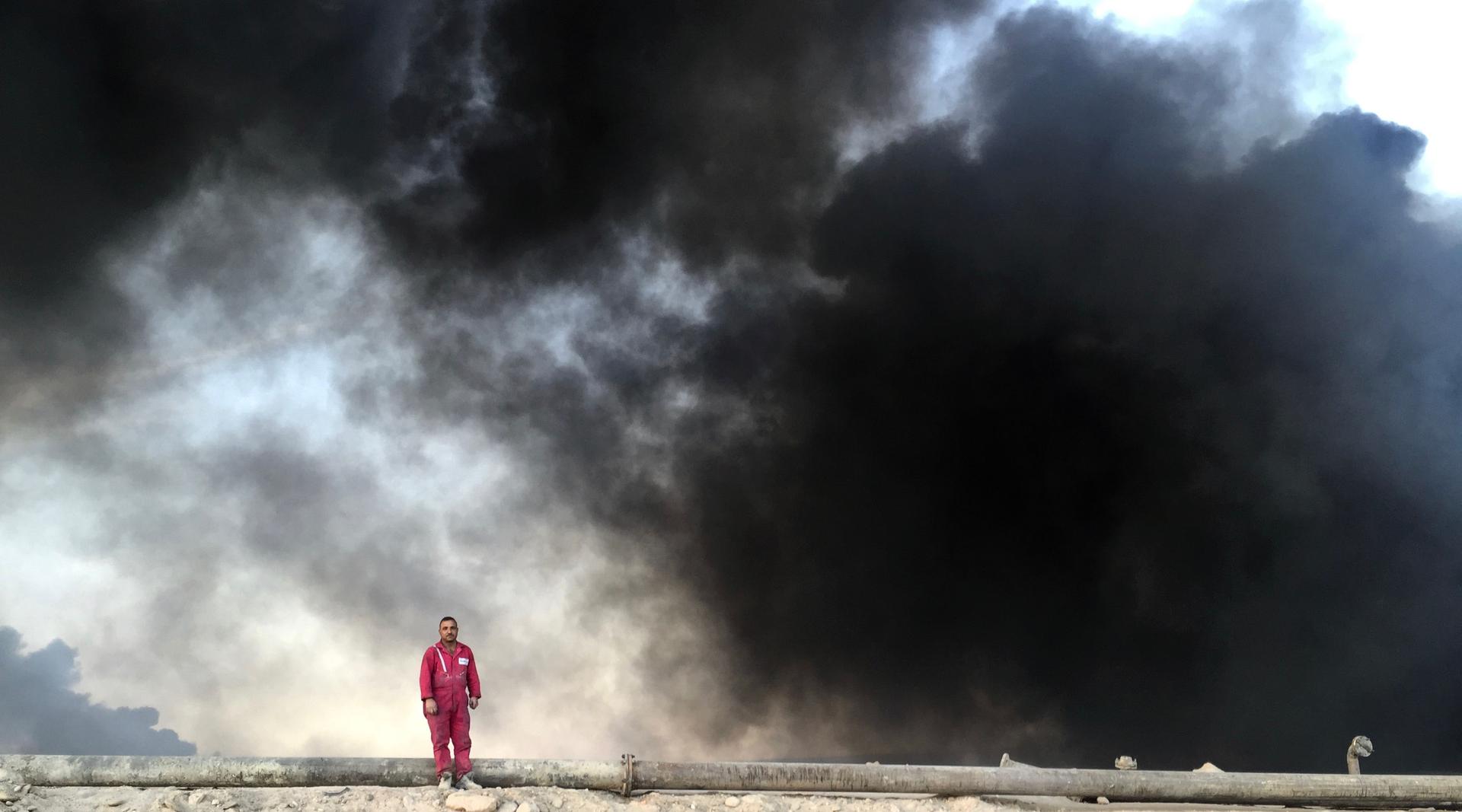ISIS was booted from this Iraqi town months ago, but its toxic oil fires won’t die
Khairallah Jaddaa, an Iraqi firefighter, at an oil well blaze in Qayyarah on Nov. 21.
On a large patch of dusty wasteland on the edge of the northern Iraqi town of Qayyarah, a group of boys are playing a game of soccer.
Looming above them, at times blocking the sunlight and darkening the field, several giant plumes of smoke reach into the sky from burning oil wells.
“We are Iraqis, we have lived many wars, we can do anything,” says 13-year-old Yehia Ayoub, when asked how he could play with fumes all around him. “We are made of iron!”
But many of his teammates don’t share his bravado.
“We feel it a lot. It feels like suffocating,” says another boy, who did not want to give his name, during a short rest from the game.
Oil well fires burning all around them, smoke filling the air, war going on a few towns over, but this kid just scored a belter. pic.twitter.com/lcHzFX2sIz
— Richard Hall (@_RichardHall) November 22, 2016
The smoke, and the thick soot it leaves on everything it touches, was a parting gift ISIS left this town. ISIS fighters set fire to oil wells to cover their retreat as the Iraqi army chased the group out in August — a precursor to the offensive to retake Mosul, ISIS’ last major stronghold in Iraq, 40 miles north.
The smoke was aimed at blocking US fighter jets’ view as the ISIS militants retreated, just as Saddam Hussein’s forces had done in Kuwait during the 1991 Gulf War.
The fires in Qayyarah have been burning for months. Now, residents from the town and surrounding villages are flocking to hospitals with sicknesses from the black clouds.
“We get between seven and 10 cases every day,” says Mahmoud Othman, a nurse at a clinic in Qayyarah. “Most of the problems we get are related to breathing, inflammation of the lungs, shortening of breath, suffocation. We even get cases of diarrhea and vomiting due to the smoke.”
Othman says the elderly and children under 10 are suffering the most, and that some families closest to the fires have had to move away.
“They can’t go anywhere else. Some people rented houses far from the wells, others stayed with relatives and some left to different villages,” he says.
Another problem for those wanting to escape the black clouds: Iraq is already witnessing a humanitarian catastrophe due to the ongoing military offensive to recapture Mosul from ISIS. Since October, more than 68,000 people have been displaced from the city — meaning camps are crowded and humanitarian groups already strained.
The clouds of smoke darken the sky for miles around Qayyarah. Entering the town feels like passing through time from morning to dusk in an instant. In the streets, many children walk around with dust covering their hands and faces, and a change in wind’s direction can choke a village or give respite in a matter of minutes.
Alaa, a 16-year-old shepherd, spends most of the day in the fields just outside town with his flock of sheep — all of which are now black.

He says the value of his sheep has declined because they’re becoming sick from the fumes.
“Some of my sheep were affected by the [smoke], some not. Our prices have gone down now,” says Alaa, who gave only his first name.
He says despite being out all day, the smoke hasn’t gotten to him yet.
The scale of the fires and the complexity of putting them out has overwhelmed authorities. More than a dozen oil wells were set alight by ISIS, only two have been put out so far.
Firefighters must first clear the area for mines — which may have been left behind by ISIS — then extinguish the flames in a way that does not make the situation worse.
“Putting out an oil well fire is a massive, costly and very challenging logistical operation, which requires special equipment and sufficient technical expertise,” Emilia Wahlstrom, of a United Nations environment team here, told us. “It’s not only about putting out the fire, but also about sealing the wellhead to stop gas or oil from coming up and reigniting.”
This Iraqi oil well has burned since August, after ISIS fighters set fires as they retreated, in Qayyarah, near Mosul. (via @_RichardHall) pic.twitter.com/OifLZYzzwn
— Seeking Security (@pri_security) November 22, 2016
At one of the wells, yards-high flames burn loudly while a tired-looking lone firefighter stands smokes a cigarette nearby.
“We put out the fire near a hospital, and another over there, but there is more work to do,” Khairallah Jaddaa says, wearily. “We have engineers here helping us to put it out. It’s their specialty, they know how to deal with it.”
Jaddaa says he has been working on putting the fires out for more than a month. Behind him, a newly constructed pipe is pumping water into a large hole next to the fire. He says it will take a while longer to put this fire out.
The oil well fires aren’t the only environmental catastrophe to have hit this area in recent months. ISIS fighters also reportedly set ablaze a processing facility at a sulfur mine in Mishraq, between Qayyarah and Mosul, in October.
The blaze released deadly sulfur dioxide into the air, prompting 1,000 people to seek medical treatment, according to the UN.
UN environment chief Erik Solheim recently called the combination of the sulfur blaze and oil fires “a recipe for a prolonged disaster.”
“It makes living conditions dangerous and miserable, if not impossible. It will push countless people to join the unprecedented global refugee population. That’s why the environment needs to be placed at the center of crisis response, conflict prevention and conflict resolution," he said in a statement in late October.
A UN investigation into the situation in Qayyarah published on Nov. 8 found that the burning of the wells and the sulfur plant “may have a long-lasting effect on the environment.”
“Acidic gases and precipitation may damage vegetation and increase the acidity of watercourses (rivers and streams). Agriculture may be temporarily affected, where the impacts will depend on the soil buffering capacity,” the report said.
Back at the clinic in Qayyarah, Saddam Joumaa Ahmad expresses frustration at the officials’ inability to quench the blazes.
“We asked the authorities to extinguish the fires. There are teams of firefighters present near the wells, but they say there is a process,” he says.
Meanwhile, he says, “the suffering increases day after day.”
The story you just read is accessible and free to all because thousands of listeners and readers contribute to our nonprofit newsroom. We go deep to bring you the human-centered international reporting that you know you can trust. To do this work and to do it well, we rely on the support of our listeners. If you appreciated our coverage this year, if there was a story that made you pause or a song that moved you, would you consider making a gift to sustain our work through 2024 and beyond?
